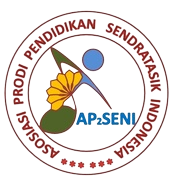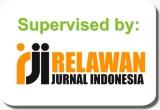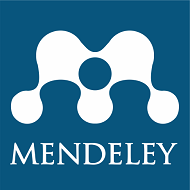- Focus and Scope
- Section Policies
- Peer Review Process
- Publication Frequency
- Open Access Policy
- Archiving
- Screening For Plagiarism
- Publication Ethics
- Author Fees
- Plagiarism Policy
- Field of Study
Focus and Scope
Gesture: Jurnal Seni Tari contains scientific papers and research on traditional dance and non-traditional dance, raising issues related to the development of dance education. In this case, Gesture: Jurnal Seni Tari will always be consistent in trying to accommodate all forms of scientific writing related to the fields of Teaching, Assessment, Presentation, Creation, Arts Management and Cultural Sciences
Section Policies
Articles
Peer Review Process
An editor first reviews the submitted manuscript. Next, the office will evaluate whether it suits our focus and scope or has a major methodological flaw. Every submitted manuscript which passes this step will be checked to identify any plagiarism before being reviewed. This journal uses a double-blind review in two rounds. First round, two reviewers will review the content of the submitted article in the general. This reviewed article will be sent back to the author through section editor for revising. Reviewers' comments are also sent anonymously to the corresponding author to take the necessary actions and responses. The author should send back the revised version of their article to get reviewed in the next round. In the second round here, the revised article will be reviewed again to make sure its quality content prior to the publication. Finally, the revised manuscript's decision will be evaluated in an editorial board meeting, based on the reviewer's recommendation from several possibilities: rejected, require major revision, need minor revision, or accepted. The Editor-in-Chief of Gesture: Jurnal Seni Tari has the right to decide which manuscripts submitted to the journal should be published.
Publication Frequency
Gesture: Jurnal Seni Tari is published twice a year in April and October.
Open Access Policy

This journal provides immediate OPEN ACCESS to its content on the principle that making research freely available to the public supports a greater global exchange of knowledge.
Benefits of open access for the author, include:
- Free access for all users worldwide
- Authors retain copyright to their work
- Increased visibility and readership
- Rapid publication
- No spatial constraints
Archiving
This journal utilizes the LOCKSS system to create a distributed archiving system among participating libraries and permits those libraries to create permanent archives of the journal for purposes of preservation and restoration. More...
Screening For Plagiarism
The manuscript that submitted into this journal will be screened for plagiarism using TURNITIN.COM
Publication Ethics
Introduction
A 'code of conduct that outlines desired behaviour and obligations of members of the scientific profession is needed to publish an article in a peer-reviewed journal. Such a code of conduct attempts to optimize the advantages of science to society and the work. For example, the advancement of science necessitates sharing knowledge, even though this may sometimes forego any immediate personal benefit.
The publication of scientific research in journals is one of Gesture: Jurnal Seni Tari fundamental ways: traditional dance and non-traditional dance, raising issues related to the development of dance education. To this end, editors, reviewers, authors and publishers must maintain high ethical standards with regard to manuscripts in Gesture: Jurnal Seni Tari
Editors
Editors have the following responsibilities:
- To decide which of the articles submitted to the journal should be published. Editors are accountable and responsible for everything they post.
- To decide to accept or reject a manuscript for publication with reference only to the manuscript's importance, originality and clarity, and its relevance to the journal.
- To acknowledge receipt of submitted manuscripts and ensure the fair, efficient, and timely review process.
- To assess manuscripts for the intellectual subject matter disregarding race, gender, religious belief, sexual orientation, ethnic origin, citizenship, or political philosophy of the authors.
- To guarantee that submitted manuscripts are handled in personal conduct, with no details being disclosed to anyone, except the reviewers, without the author's permission until a decision has been taken as to whether the manuscript is to be published.
- Not unveil any information about a submitted manuscript to anyone excluding the corresponding author, reviewers, potential reviewers, other editorial advisers, and the publisher, as appropriate.
- Not to use for their research, work reported in unpublished submitted articles.
- To act in response to any suggestions of scientific misconduct or convincing evidence that a published manuscript's primary substance or conclusions are mistaken, usually through consultation with the author. This may necessitate the publication of a formal withdrawal or amendment.
- To determine rationally responsive measures when ethical objections have been presented concerning a submitted manuscript or published paper associated with the publisher (or society).
Reviewers
Reviewers should:
- Only agree to review manuscripts for which they have the subject expertise required to conduct an appropriate evaluation and which they can assess on time.
- Acknowledge that peer review is a joint effort and undertake to conduct their fair share of reviewing and on time.
- Be objective and constructive in their reviews, abstaining from being hostile and from making offensive personal remarks.
- Have a non-influenced review, neither by the author's nationality, religious nor political beliefs of the author, gender nor other characteristics of the authors nor by commercial considerations.
- Treat any manuscripts received for review as confidential documents. Therefore, they must not be shown to or discussed with others except as authorized by the editor.
- Not use information obtained during the peer-review process for their own or any other person's or organization's advantage or to disadvantage or discredit others.
- Recognize relevant published work that has not been referred to by the authors. Any statement that an observation, derivation, or argument had been previously reported should be completed by pertinent reference.
- State all possible conflicting interests, looking for recommendations from the journal if they are hesitant whether something constitutes a relevant interest.
Authors
Authors have the following responsibilities:
- To present a report of the research that has been conducted ethically and responsibly.
- To present their results truthfully and without fraudulent, misrepresentation or improper data manipulation.
- To provide, if needed, the unprocessed data in connection with a paper for editorial review.
- To ensure that the work they submitted is original. If the authors have used the work and words, this has been appropriately cited or referred. Plagiarism in all its forms comprises unethical publishing manners and is intolerable.
- To describe their methods clearly and explicitly so that others can confirm their findings.
- Take collective responsibility for submitted and published work.
- The authorship of research publications should precisely reveal individuals' contributions to the work and its reporting.
- To disclose in their manuscript any financial or another substantive conflict of interest that might be construed to influence the results or interpretation of their manuscript. All sources of financial support for the project should be disclosed.
- Report to the journal editor or publisher without delay if an author notices a significant inaccuracy or erroneousness in their published work. They have to collaborate with the editor to withdraw or correct the paper.
Publishers
Publishers should:
- Define the relationship between publisher, editor and other parties in a contract.
- Respect privacy (for example, for research participants, for authors, for reviewers).
- Defend intellectual property and copyright.
- Promote editorial independence.
- Work with journal editors to:
- Regulate journal policies appropriately and aspire to meet those policies, mainly editorial independence; research ethics; authorship; clearness and honesty; peer review, appeals and complaints.
- Inform journal policies to authors, readers, reviewers.
- Evaluate journal policies periodically.
- Preserve the integrity of the academic record.
- Support the parties in charge to investigate suspected research and publication misconduct and, where possible, assist in resolving these problems.
- Issue amendments, clarifications, and retractions.
- Publish content on a timely basis.
Author Fees
This journal charges the following author fees.
Article Submission: 0.00 (IDR)
Authors are not charged for any cost the article submission
Article Publication: 300000.00 (IDR)
If this paper is accepted for publication, you will be asked to pay an Article Publication Fee to cover publications costs.
If you do not have funds to pay such fees, you will have an opportunity to waive each fee. We do not want fees to prevent the publication of worthy work.
Plagiarism Policy
Gesture: Jurnal Seni Tari Editorial board recognizes that plagiarism is not acceptable and therefore establishes the following policy stating specific actions (penalties) upon identification of plagiarism/similarities in articles submitted for publication in Grenek. Grenek: Jurnal Seni Musik will use Turnitin's originality checking software as the tool in detecting similarities of texts in article manuscripts and the final version articles ready for publication. A maximum of 25 % of similarities is allowed for the submitted papers. Should we find more than 25 % of the similarity index, the article will be returned to the author for correction and re-submission.
Definition:
Plagiarism involves the "use or close imitation of the language and thoughts of another author and the representation of them as one's own original work."
Policy:
Papers must be original, unpublished, and not pending publication elsewhere. Any material taken verbatim from another source needs to be clearly identified as different from the present original text by (1) indentation, (2) use of quotation marks, and (3) identification of the source.
Any text of an amount exceeding fair use standards (herein defined as more than two or three sentences or the equivalent thereof) or any graphic material reproduced from another source requires permission from the copyright holder and, if feasible, the original author(s) and also requires identification of the source; e.g., previous publication.
When plagiarism is identified, the Editor in Chief responsible for the review of this paper and will agree on measures according to the extent of plagiarism detected in the paper in agreement with the following guidelines:
LEVEL OF PLAGIARISM
Field of Study
Gesture: Jurnal Seni Tari is a journal managed by Departement of Dance Education, Faculty of Languages and Arts, Universitas Negeri Medan which contains about:
1. Dance Education
2. Dance and Learning Studies
3. Analysis of Dance Works
4. Dance Composition
5. Dance Development and Innovation
6. History of Dance
7. Anthropology of Dance

.jpg)








